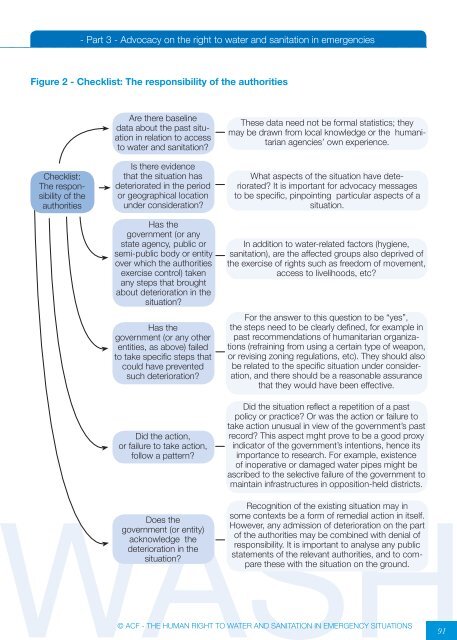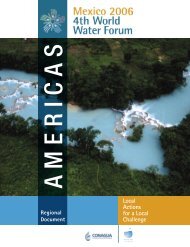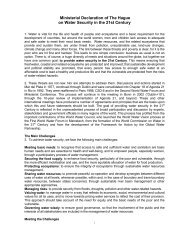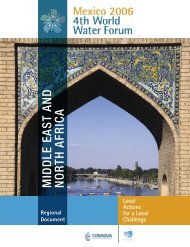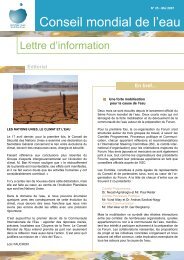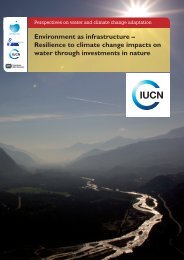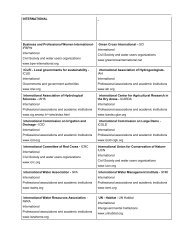the human right to water and sanitation in emergency situations
the human right to water and sanitation in emergency situations
the human right to water and sanitation in emergency situations
Create successful ePaper yourself
Turn your PDF publications into a flip-book with our unique Google optimized e-Paper software.
Figure 2 - Checklist: The responsibility of <strong>the</strong> authorities<br />
Checklist:<br />
The responsibility<br />
of <strong>the</strong><br />
authorities<br />
- Part 3 - Advocacy on <strong>the</strong> <strong>right</strong> <strong>to</strong> <strong>water</strong> <strong>and</strong> <strong>sanitation</strong> <strong>in</strong> emergencies<br />
Are <strong>the</strong>re basel<strong>in</strong>e<br />
data about <strong>the</strong> past situation<br />
<strong>in</strong> relation <strong>to</strong> access<br />
<strong>to</strong> <strong>water</strong> <strong>and</strong> <strong>sanitation</strong>?<br />
Is <strong>the</strong>re evidence<br />
that <strong>the</strong> situation has<br />
deteriorated <strong>in</strong> <strong>the</strong> period<br />
or geographical location<br />
under consideration?<br />
Has <strong>the</strong><br />
government (or any<br />
state agency, public or<br />
semi-public body or entity<br />
over which <strong>the</strong> authorities<br />
exercise control) taken<br />
any steps that brought<br />
about deterioration <strong>in</strong> <strong>the</strong><br />
situation?<br />
Has <strong>the</strong><br />
government (or any o<strong>the</strong>r<br />
entities, as above) failed<br />
<strong>to</strong> take specific steps that<br />
could have prevented<br />
such deterioration?<br />
Did <strong>the</strong> action,<br />
or failure <strong>to</strong> take action,<br />
follow a pattern?<br />
Does <strong>the</strong><br />
government (or entity)<br />
acknowledge <strong>the</strong><br />
deterioration <strong>in</strong> <strong>the</strong><br />
situation?<br />
These data need not be formal statistics; <strong>the</strong>y<br />
may be drawn from local knowledge or <strong>the</strong> <strong>human</strong>itarian<br />
agencies’ own experience.<br />
What aspects of <strong>the</strong> situation have deteriorated?<br />
It is important for advocacy messages<br />
<strong>to</strong> be specific, p<strong>in</strong>po<strong>in</strong>t<strong>in</strong>g particular aspects of a<br />
situation.<br />
In addition <strong>to</strong> <strong>water</strong>-related fac<strong>to</strong>rs (hygiene,<br />
<strong>sanitation</strong>), are <strong>the</strong> affected groups also deprived of<br />
<strong>the</strong> exercise of <strong>right</strong>s such as freedom of movement,<br />
access <strong>to</strong> livelihoods, etc?<br />
For <strong>the</strong> answer <strong>to</strong> this question <strong>to</strong> be “yes”,<br />
<strong>the</strong> steps need <strong>to</strong> be clearly def<strong>in</strong>ed, for example <strong>in</strong><br />
past recommendations of <strong>human</strong>itarian organizations<br />
(refra<strong>in</strong><strong>in</strong>g from us<strong>in</strong>g a certa<strong>in</strong> type of weapon,<br />
or revis<strong>in</strong>g zon<strong>in</strong>g regulations, etc). They should also<br />
be related <strong>to</strong> <strong>the</strong> specific situation under consideration,<br />
<strong>and</strong> <strong>the</strong>re should be a reasonable assurance<br />
that <strong>the</strong>y would have been effective.<br />
Did <strong>the</strong> situation reflect a repetition of a past<br />
policy or practice? Or was <strong>the</strong> action or failure <strong>to</strong><br />
take action unusual <strong>in</strong> view of <strong>the</strong> government’s past<br />
record? This aspect mght prove <strong>to</strong> be a good proxy<br />
<strong>in</strong>dica<strong>to</strong>r of <strong>the</strong> government’s <strong>in</strong>tentions, hence its<br />
importance <strong>to</strong> research. For example, existence<br />
of <strong>in</strong>operative or damaged <strong>water</strong> pipes might be<br />
ascribed <strong>to</strong> <strong>the</strong> selective failure of <strong>the</strong> government <strong>to</strong><br />
ma<strong>in</strong>ta<strong>in</strong> <strong>in</strong>frastructures <strong>in</strong> opposition-held districts.<br />
Recognition of <strong>the</strong> exist<strong>in</strong>g situation may <strong>in</strong><br />
some contexts be a form of remedial action <strong>in</strong> itself.<br />
However, any admission of deterioration on <strong>the</strong> part<br />
of <strong>the</strong> authorities may be comb<strong>in</strong>ed with denial of<br />
responsibility. It is important <strong>to</strong> analyse any public<br />
statements of <strong>the</strong> relevant authorities, <strong>and</strong> <strong>to</strong> compare<br />
<strong>the</strong>se with <strong>the</strong> situation on <strong>the</strong> ground.<br />
© ACF - THE HUMAN RIGHT TO WATER AND SANITATION IN EMERGENCY SITUATIONS<br />
91


